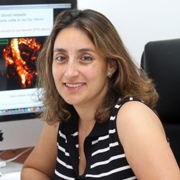Prof. Ronit Satchi-Fainaro, Ph.D.

Affiliations
President, Israeli Chapter of The Controlled Release Society
Head, Vascular Biology and Nanomedicine Laboratory
Chair, Department of Physiology and Pharmacology, Sackler School of Medicine, Tel Aviv University
Biography
Prof. Ronit Satchi-Fainaro (Ph.D.) is Head of the Cancer Angiogenesis & Nanomedicine Laboratory;
Associate Professor, Chair of the Department of Physiology & Pharmacology, Sackler School of Medicine. Prof. Satchi-Fainaro received her Bachelor of Pharmacy from the Hebrew University, Israel (1995) and her Ph.D. from the University of London, UK (2000). She then spent four years as postdoctoral fellow at Harvard University and Children’s Hospital Boston working with Judah Folkman. She joined Tel Aviv University in 2005.
She is a leader in the field of nanomedicine and angiogenesis. She serves as advisor to several Israeli and International biotech companies, is President of the Israeli Society for Controlled Release. She has published 65 papers, 12 book chapters, edited 2 books, is named inventor on 25 patents, appeared on several lists (Forbes, Globes, Calcalist, The Marker) of the 40 most promising and influential people in Israel and was awarded numerous prestigious grants and prizes.
She has major expertise in tumor biology, tumor dormancy, angiogenesis, molecular imaging, non-invasive intravital imaging of tumor models, personalized nanomedicines for cancer theranostics. Her multi-disciplinary research laboratory focuses on basic research leading to the design of highly-selective targeting molecules integrating biology, chemistry, protein engineering, molecular imaging, computational approaches, material sciences and nanotechnology to selectively guide drugs into pathological sites.
Abstract
Identification, validation and therapeutic potential of dormancy-associated microRNA nano-polyplexes for cancer theranostics

